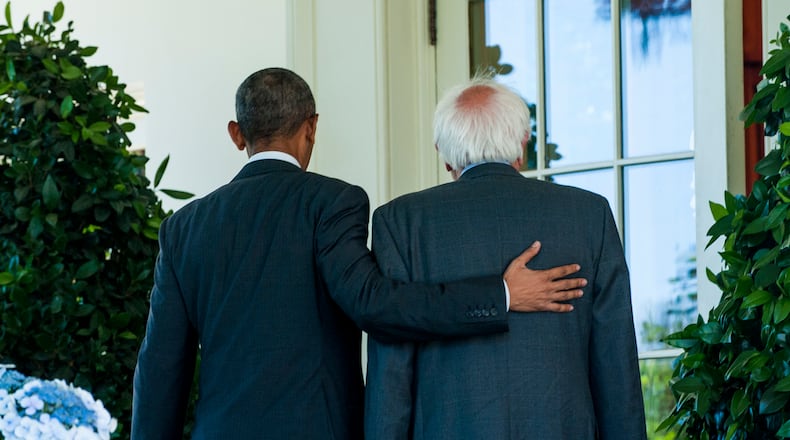Last Monday, the Associated Press declared that Hillary Clinton had the majority of delegates she needed to claim the Democratic nomination for president, and would become the first woman to top the ticket of a major American political party. Her only rival, Bernie Sanders, refused to concede.
On Tuesday, doing well in a majority of six state contests, Clinton won an outright majority of pledged convention delegates. Sanders still refused to give up. So on Thursday, President Barack Obama did it for him.
The choreography was coolly efficient. After a White House meeting, Obama walked the Vermont senator to a scrum of reporters. Everyone said nice things. Then the pair turned and Obama – his hand on the senator’s back, urging him along — escorted Sanders offstage. Obama’s video endorsement of Clinton, taped well in advance, was quickly uploaded to YouTube.
The world’s most powerful referee, the ultimate Democrat, had just called the match.
Sanders and his supporters claim their never-say-die journey to Philadelphia is about a movement, not a candidate. So expiration dates don’t apply. But something else is happening, too. The concession call, in which the defeated candidate picks up the phone and confesses to the victor, “Well, you whupped me good, Joe-Bob,” is disappearing from politics.
The arithmetic of election night has become yet another slice of reality that is undeserving of recognition or respect.
Consider: U.S. Reps. Barry Loudermilk of Cassville and Doug Collins of Gainesville had a total of eight opponents in last month’s GOP primary. Both incumbents won. But only one of the eight challengers, former congressman Paul Broun, observed the traditional formalities. His call to Collins was short, we’re told. But it still counts.
“Nobody wants to make the call, but you do,” said Dan McLagan, who was a consultant to the Loudermilk campaign. “It’s a matter of class. You’re not a good human if you don’t do that.”
McLagan has been on every side of that phone call. In 1994, he was the spokesman for the Virginia campaign of Ollie North, the Iran Contra figure challenging Democratic incumbent Chuck Robb’s bid for a second term in the U.S. Senate. Everywhere else, Republicans were winning — this was the November of the Newt Gingrich revolution. But not in Richmond.
“Some of our top consultants came in, saw the numbers going the wrong way, and left,” McLagan said. There were plenty of good-time parties elsewhere.
Early in the day, McLagan had swapped the appropriate phone numbers with a contact in the Robb campaign, rather like two seconds representing the combatants in a duel. When the time came, McLagan went upstairs to North’s room and found his candidate in slacks and a T-shirt.
“Colonel, it’s time to make the call to Senator Robb.”
North asked for a few more minutes. “I want to have my coat and tie on for this,” he said. That’s how important the concession call was 22 years ago.
Perhaps its disappearance can be attributed, in part, to the ugliness of modern contests. In the Loudermilk campaign, the Republican incumbent’s chief rival was Daniel Cowan, a self-funding businessman with overseas interests. Loudermilk accused him of profiting from business deals in Iran through a partner. (Attempts this week to reach Cowan, who denied the charges, were unsuccessful.)
Yet others have been accused of worse. In 2002, Gov. Roy Barnes made perhaps the most unpleasant concession call in Georgia political history, admitting defeat and the end of more than a century of Democratic rule to Republican challenger Sonny Perdue, who had portrayed him as a vermin-spreading rat. Yet the call was necessary to begin the process of transferring power.
Money may have something to do with the decline of the concession call. Self-funders answer to no one. And social media-based fundraising platforms allow others, Bernie Sanders among them, a large degree of fiscal independence from traditional cash sources.
In 2012, Republican Martha Zoller lost to Doug Collins in a primary runoff — the same Doug Collins mentioned above. The tone at the end was harsh. Collins had a financial advantage and the backing of Gov. Nathan Deal. Still, Zoller made the call and admitted defeat. “It’s the right thing to do. I think it’s small and petty when you don’t,” she said. “Also, I think a lot of people aren’t raised right.”
But there was another reason for politeness — a practical reason. Zoller wasn’t rich. She still isn’t. Her campaign had run a deficit, and she still needed access to Republican donors to help erase it. Show yourself something other than a team player, and an impolite stick-in-the-mud besides, and that donor help can disappear. Zoller’s debt is now gone.
Then again, maybe this is a generational thing. Everything else is less formal among you young whippersnappers. Perhaps the rules of defeat should be, too.
Last month, state Rep. Mary Margaret Oliver of Decatur found herself in an unexpectedly heated campaign with a Democratic primary challenger, Brian Westlake, a young public school teacher, also of Decatur. Outside money entered the contest, questioning Oliver’s support for Governor Deal’s initiative that would give state government the power to take control of failing schools.
Oliver trounced Westlake with 75 percent of the vote. The next day Westlake left a voice-mail message. “He said, ‘Congratulations, and I think you ought to reconsider your position on the Opportunity School District bill,’” Oliver reported. The referendum is in November.
We've reached out to Westlake, though we haven't heard back. Yet there was something Bernie Sanders-like in the message that Oliver described. The fight is never over. And if it’s never over, there is never any need to admit defeat.
Quick — someone call Lord Cornwallis. He might have been a little hasty at Yorktown.
About the Author
The Latest
Featured




